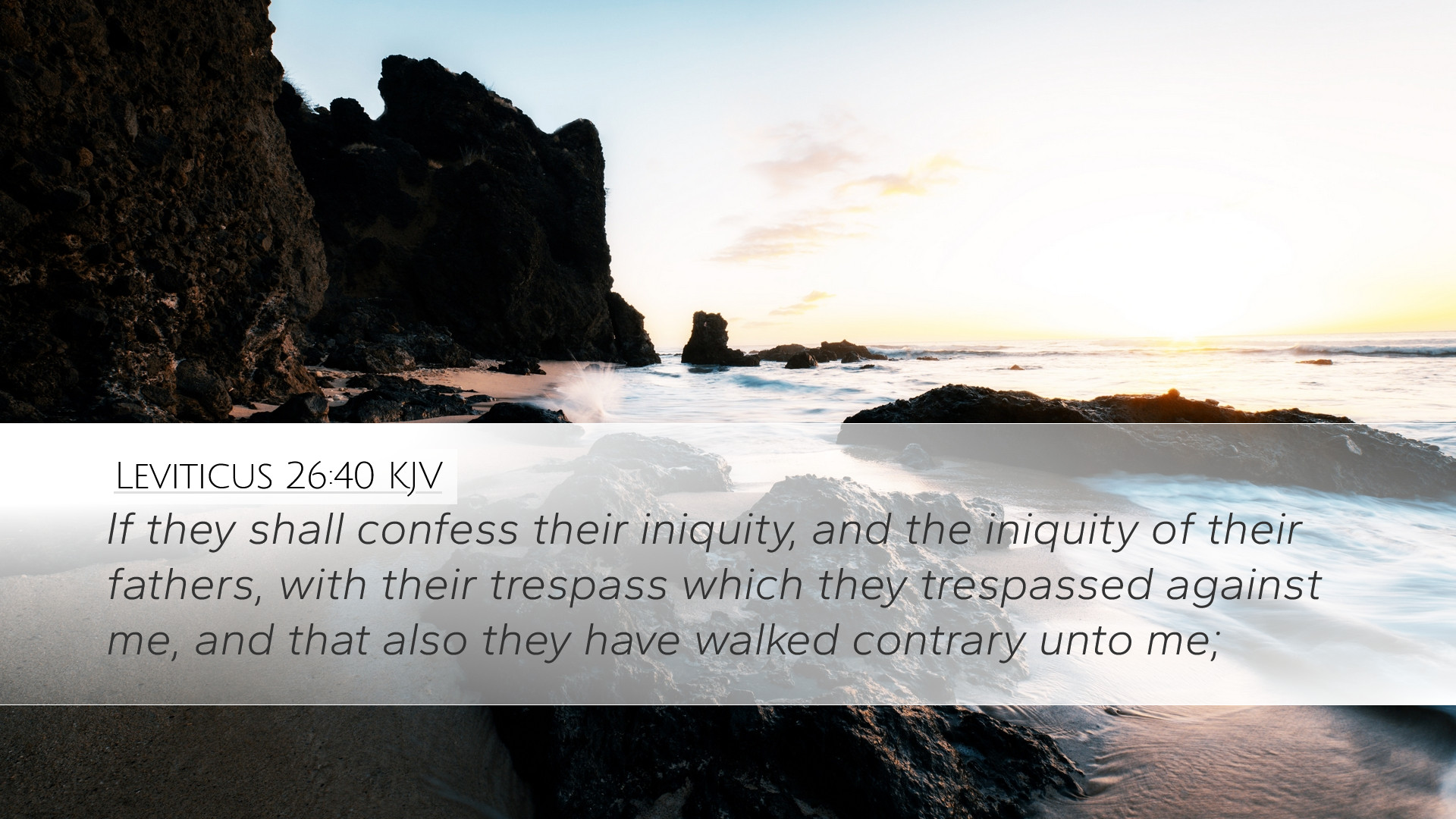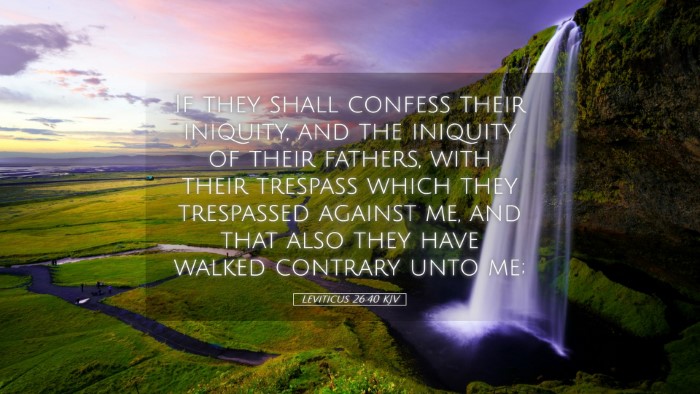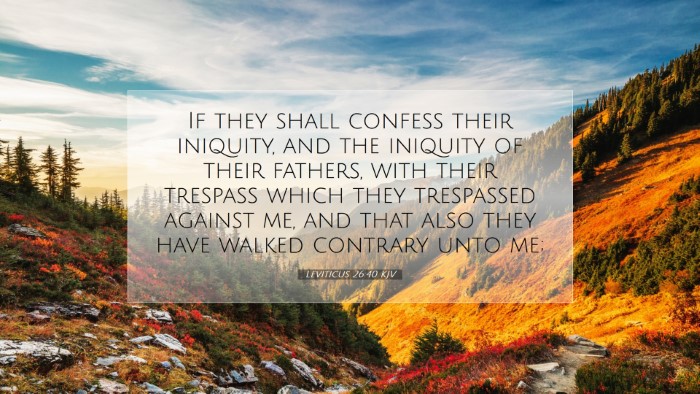Commentary on Leviticus 26:40
Leviticus 26:40 states, "If they shall confess their iniquity, and the iniquity of their fathers, with their trespass which they trespassed against me, and that also they have walked contrary unto me." This verse is pivotal in understanding the relationship between God and His people, focusing on the themes of repentance, acknowledgment of sin, and the conditional nature of God's covenant with Israel.
Contextual Background
Leviticus 26 is part of the conclusion of the holiness code, which outlines the blessings for obedience and the curses for disobedience. The previous verses describe the severe consequences for Israel's unfaithfulness, painting a vivid picture of national calamity resulting from turning away from God. However, in verse 40, we witness a transition where hope and restoration are introduced through confession and repentance.
Insights from Matthew Henry
Matthew Henry emphasizes the importance of confession as a pathway to restoration. He notes that the acknowledgment of both individual and communal sin ("the iniquity of their fathers") reflects a deep understanding of the consequences of sin that transcend generations.
-
Confession of Sins: Henry highlights that true repentance requires a clear confession of sins before God. The admission of wrongdoing, both personal and ancestral, indicates a sincere heart seeking reconciliation with the divine.
-
Importance of Acknowledging Heritage: The mention of "the iniquity of their fathers" serves as a reminder that the actions of previous generations impact the current state of God’s people. This acknowledgment leads to a collective responsibility to break from past sins.
Insights from Albert Barnes
Albert Barnes provides a commentary that further deepens the understanding of this verse, noting the covenantal relationship between God and Israel. He explains that the phrase "if they shall confess" signals a conditional promise, showcasing God's willingness to forgive and restore when His people turn back to Him.
-
Condition of Restoration: Barnes elucidates that the restoration outlined in the surrounding verses hinges upon the act of confession. It is a critical precondition to receiving God's mercy and favor.
-
Divine Justice and Mercy: The dual themes of justice and mercy are prevalent in Barnes's exposition. While God is just in punishing sin, He is equally merciful, always ready to forgive those who genuinely repent.
Insights from Adam Clarke
Adam Clarke contributes to the understanding of this scripture by emphasizing the communal aspect of sin and confession. He remarks on how the acknowledgment of both personal and familial guilt is essential for true repentance and highlights the power of collective confession within the community of believers.
-
Role of Community in Confession: Clarke insists that individual repentance is important, but so is the recognition of collective guilt. He underscores that the faithful community must shoulder the burdens of sin together as they seek divine forgiveness.
-
Promises of Restoration: Clarke also notes that this confession leads to critical promises from God, emphasizing that reconciliation with God is always within reach for those willing to repent and turn back to Him.
Theological Implications
The implications of Leviticus 26:40 extend beyond its historical context, offering significant theological insights relevant to contemporary believers. The necessity of confession as a precursor to restoration is a theme echoed throughout scripture, resonating in the New Testament calls for repentance by Christ and His apostles.
-
Restoration through Confession:
The message is clear: confession is a foundational element in the life of faith. As pastors and theologians reflect on this text, they recognize that the path to spiritual renewal and community healing begins with a humble acknowledgment of sin.
-
The Continuity of Covenant:
The covenant relationship between God and His people remains steadfast. This verse demonstrates that while sin incurs serious consequences, God's readiness to restore and forgive is equally steadfast, inviting believers to turn back to Him.
Pastoral Application
For pastors and spiritual leaders, Leviticus 26:40 presents an opportunity to teach about the nature of sin, repentance, and the faithfulness of God. Encouraging congregations to recognize their collective need for repentance can foster a more profound pursuit of holiness and a deeper reliance on God's grace.
-
Encouraging Confession: Leaders should create a safe space for individuals to confess their sins and seek accountability within the faith community. Incorporating confession into worship practices can reinforce the importance of this spiritual discipline.
-
Emphasizing God's Faithfulness: Pastors can use this verse to remind congregations of God's unwavering commitment to His people, assuring them that no matter the depth of their sin, reconciliation is always possible through humility and confession.
Conclusion
Leviticus 26:40 encapsulates a profound truth about the nature of God and His relationship with humanity. By acknowledging their iniquity, both personal and communal, God’s people open the door to forgiveness and restoration. This verse serves as a timeless reminder that, regardless of past failures, God's mercy is ever-present and His desire for reconciliation unchanging. It urges each believer to engage in genuine repentance, setting a foundation for a life anchored in faithfulness to God.


